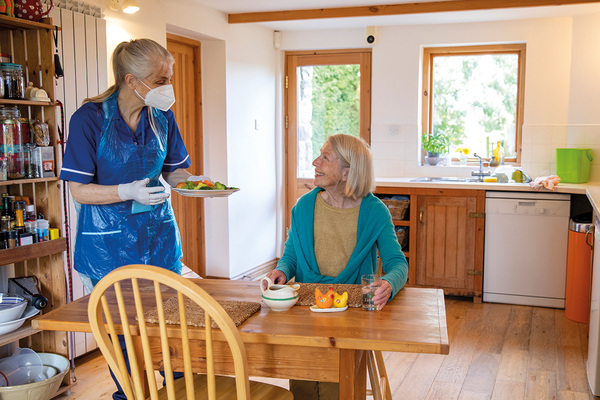Housing is a crucial part of the healthcare pathway for people with mental ill health and learning disabilities
As part of the #PlanForHousing campaign, Clare Skidmore and Tonita Whittier of NHS England’s mental health, learning disability and autism programme share how housing is a vital part of their work

Our shared vision is to enable everyone – whatever their individual health, care or support need – to have a place they can call home. Through the security of having a home and enabling their sense of belonging, people are more likely to be able to avoid a hospital admission and live healthy, meaningful lives in their own communities, near the people they know and love, in the places that matter to them.
Health outcomes and inequities should be considered whenever we are thinking about and planning for our population’s future housing needs, whether that means deciding where to build new homes, how new homes should be designed, how to prioritise the housing needs of particular groups and how to enable people to adapt their existing homes, so that they can continue living there for as long as possible and any barriers to access are removed.
In practice, this means a young person with sensory needs being able to finally leave hospital following a long period of mental ill health and move into their own home after it has been designed or adapted to meet their specific needs.
It means an older adult with a learning disability, having lived with their mum and dad all their life, finding security and independence by getting the keys to their own place. This is likely to be a big relief to their parents, who are now no longer quite so worried about the future for their adult child.
For people with a learning disability, autistic people and people with mental health needs, access to suitable housing (including financial support and advice when required) is an essential enabler to living well in the community rather than in a mental health inpatient hospital.
The NHS England learning disability and autism programme includes a focus on housing as part of its wider activities to encourage and promote investment in support and infrastructure to help people live well in the community. This programme delivers a relatively small, but highly impactful housing capital programme to fund homes for some of the most vulnerable people with a learning disability and autistic people, many of whom need a new and specially adapted home to enable them to leave a mental health inpatient hospital.
It has also published Brick by Brick, a discharge planning guide for those supporting people with a learning disability and autistic people to consider housing options that will enable someone to leave mental health inpatient hospital.
“When the NHS works in true partnership with its local authority colleagues, alongside housing partners and social care providers, great outcomes can be achieved for the people we all serve”
In addition, the NHS England mental health programme has made it clear that across community, crisis and inpatient mental health care, housing and accommodation support should be part of an effective care pathway. Colleagues work to promote best practice in this area, highlighting efforts to integrate at a local level, building relationships across housing, health and social care, and across different systems, pathways and services.
It is recognised across NHS England, and within local systems, that improving people’s access to the right housing remains a major challenge across the country. However, some areas are making good progress, enabled by joint leadership from housing, health and social care partners. When the NHS works in true partnership with its local authority colleagues, alongside housing partners and social care providers, great outcomes can be achieved for the people we all serve.
For example, partners within one integrated care system in the North East have established a housing, health, and care programme to build on the joint work already underway across the region to tackle this important issue, including improving housing options for people with ‘complex needs’ (including people with a learning disability, autistic people and people with significant mental health needs) among other priority groups.
Another example is in the Midlands, where a housing professional has taken on the role of head of housing and health partnerships within a local NHS Trust to co-ordinate joint action to support people’s mental health and well-being, and to help people with health and care needs to live independently.
We want to see these ways of working grow and strengthen in every area of the country.
“Housing is a foundational determinant of health. Beyond mere shelter, housing conditions profoundly impact health outcomes, with substandard living environments contributing to a myriad of health risks,” the Institute of Health Equity said.
"Nationally, NHS England is exploring fair access to public capital funding for people who need specialised and supported housing"
Alongside actions at a local level, there are some important opportunities at a national level to promote a more strategic joint approach. The Supported Housing (Regulatory Oversight) Act, which became law on 29 August 2023, introduced a new strategic planning duty for local housing authorities to collect data on the supply of supported homes, forecast future need, and produce a strategy and delivery plan every five years. This highlights the importance of joint working at a local level. (Note that consultation on how the act will be implemented is still pending.)
For the future, there are other cross-government funding and regulatory reforms that would make a significant difference to the supply of suitable housing. For example, nationally, NHS England is exploring fair access to public capital funding for people who need specialised and supported housing.
At the same time, together with partners across housing, social care and beyond, NHS England is contributing to wider efforts to explore how to enable both public and private investors to fund a greater supply of supported and specialised housing, which is so much needed to meet the current and future needs of the people we support.
With extensive knowledge of and access to evidence about the housing needs of people with mental health needs, autistic people and people with a learning disability, along with other disadvantaged groups, NHS England will continue to work collaboratively to help local areas to strengthen, learn from and share existing good practice and consider innovative options, such as homeshare or shared lives plus.
Working alongside partners to incorporate the better care fund programme to support local systems to successfully deliver the integration of health and social care in a way that supports person-centred care, sustainability and better outcomes for people and carers is crucial.
NHS England is committed to continuing to work in partnership with people with a learning disability, autistic people and those with mental health needs, together with partners in local government and other public bodies, to make sure that access to safe, affordable and suitable housing is front and centre of the conversation about what it means to live a healthy and fulfilling life
Clare Skidmore, national strategic housing lead, and Tonita Whittier, quality transformation lead, NHS England’s mental health, learning disability and autism programme
Sign up for our care and support bulletin
Already have an account? Click here to manage your newsletters












